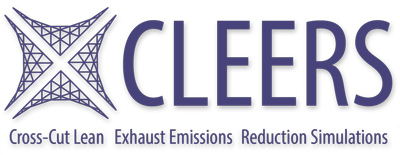Regeneration Characteristics of Diesel Particulate Filters under Transient Exhaust Conditions
Tariq Shamim, University of Michigan-Dearborn
A major challenge in developing a diesel particulate filter (DPF) with wider applications is its lower durability. The filter durability may be increased by careful design of regeneration (soot oxidation) strategies. The regeneration characteristics of a DPF under steady state conditions are well known. However, during a typical driving cycle, a DPF is subjected to highly transient conditions due to changes in driving modes. These transients result in fluctuations of exhaust flow rate, gas composition and temperature. Such modulating exhaust conditions lead to variation in oxygen and NOx concentration and gas residence over the soot layer in the DPF. These transients make the DPF performance and regeneration characteristics differ significantly from that under steady state conditions. This talk will present the results of a computational investigation, which is conducted to determine the effect of temperature and exhaust flow modulations on the regeneration characteristics of a DPF. The study contributes to a better fundamental understanding of the DPF’s performance under actual driving conditions.

